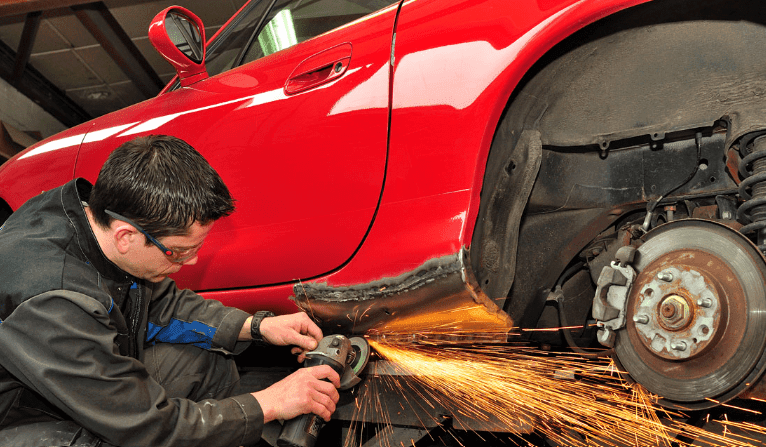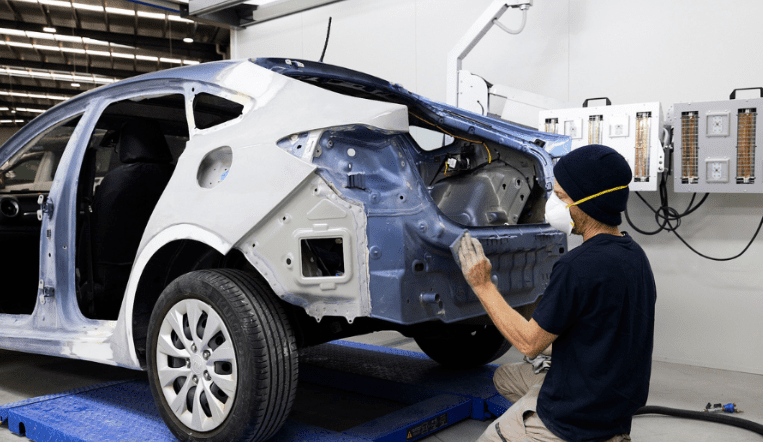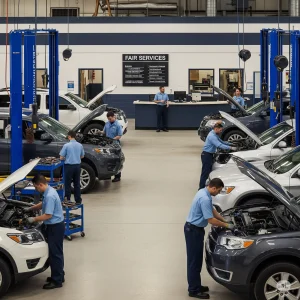When your car is involved in an accident, one of the first questions that comes to mind is: How long does collision repair take? The time required to fix your car depends on various factors, including the severity of the damage, availability of parts, and the efficiency of the repair shop. Understanding the timeline for collision repairs can help you plan accordingly and avoid unnecessary stress.
Table of Contents
ToggleTimeline Collision Meaning
The term “timeline collision” refers to the estimated time required to complete repairs after a car accident. This timeline begins once the damage is assessed and an estimate is provided, and it ends when your car is returned in proper working condition. The answer for the question of how long does collision repair take is not universal and can vary significantly based on the complexity of repairs and the expertise of the repair shop.
How Long Does Collision Repair Take?
Detection of how long does collision repair take vary, but minor repairs such as fixing dents or replacing a bumper typically take a few days to a week. However, for more extensive damage—such as fixing a car frame or addressing internal issues—repairs may take several weeks. Communication with the repair shop is crucial to understanding the specific timeline for your vehicle.
Factors That Influence Repair Timelines
1. Extent of Damage
Severe accidents often involve significant structural or internal damage, requiring more extensive diagnostic work. The more complicated the damage, the longer the repair process. For example, frame or engine issues require specialized attention and more time to ensure proper repairs.
2. Availability of Parts
The time it takes to source specific parts can greatly affect repair timelines. If parts are rare, custom-made, or imported, it may take longer to get them delivered. This is particularly true for high-end or foreign vehicles that may require specific parts not readily available in local markets.
3. Repair Shop Efficiency
The efficiency of the repair shop can impact how long does collision repair take. Busy shops or those with limited staff may struggle to complete the work on time. A shop’s capacity to handle multiple projects at once, along with its experience and organization, also plays a key role in the repair speed.
4. Insurance Approval
Waiting for insurance approval can add significant delays to the repair process. Insurance companies need to assess the damage and approve how much does collision repair cost before the shop can proceed. This can take time, especially if the vehicle damage is extensive or the claim process is complicated.
5. Additional Damages Found During Repairs
In some cases, hidden damages may be discovered during the repair process. This could include issues like internal frame damage or wiring problems that weren’t visible initially. These surprises can add extra time to the repair timeline as the shop needs to address the newly found issues

collision repair before and after
How Long Should Auto Body Repair Time Take?
1. Minor Scratches and Dents: 1-2 days
For small scratches or dents, the repair process is usually quick, taking around 1-2 days. This involves surface-level work like sanding, filling, and repainting. Since it’s not complex, the car can often be ready in a short time.
2. Bumper and Headlight Repair: 2-5 days
Repairs for bumpers and headlights generally take 2-5 days. This includes the replacement or repair of the damaged components, and possibly ordering parts. The shop may also need time to ensure everything aligns correctly.
3. Rear-End Collision Repair: 1-2 weeks
For rear-end collisions, the repair time can be 1-2 weeks. This involves replacing parts like bumpers and repairing the trunk or frame. Additional checks for hidden damage can extend the process.
4. Major Frame or Structural Repairs: 3-4 weeks or more
Major frame damage or structural repairs typically take 3-4 weeks or longer. These repairs are complex and require specialized tools. Parts may need to be ordered, and alignment must be precise to ensure the car’s safety.
Knowing how long does collision repair take helps you avoid last-minute stress and plan your schedule from the start.
Car Accident Repair Timeline
If you want to know How long does accident repair take? Or Why does collision repair take so long sometimes? You should know that The car accident repair process typically includes the following stages:
1. Damage Assessment: 1-3 days
This stage involves a thorough inspection of the vehicle to assess the extent of the damage. The repair shop will evaluate both visible and hidden issues to provide an accurate repair estimate. The complexity of the damage will determine how long does collision repair take.
2. Insurance Approval: 2-5 days
After the assessment, the repair shop sends the estimate to the insurance company for approval. The insurer will review the claim, which may take several days. Delays can occur if there are disputes or if the insurance company requires additional documentation.
3. Parts Ordering and Delivery: 1-2 weeks
Ordering and receiving parts is a critical step in the repair process. The time required depends on the availability of parts, especially for rare or specific models. If parts need to be ordered from a manufacturer or imported, this can extend the delivery time.
4. Actual Repairs: Varies based on the extent of the damage
The repair timeline can vary widely depending on the nature and extent of the damage. Minor repairs may only take a few days, while more complex repairs, such as frame or engine work, could take several weeks.
On average, if you want to know How long is reasonable for a car repair you should know that the entire process can take anywhere from 1 to 4 weeks, but it’s important to stay in contact with the repair shop for progress updates.
Car Frame Repair vs. Replacement: Which Option Is Best for You?
Frame Repair:
If the frame is slightly bent, repair might be the best option. It’s quicker and more cost-effective.
Frame Replacement:
Severe damage often requires full replacement, which takes longer but ensures the car’s safety and performance.
Discuss the options with your repair shop to determine the best course of action and how long does collision repair take.
Cost Breakdown: Bumper Repair vs. Bumper Replacement in Texas
1. Bumper Repair
Minor scratches or dents typically cost $150 to $600 in Texas. This option is affordable and ideal for minor cosmetic damage.
2. Bumper Replacement
Severe damage may cost $500 to $1,500 or more, including the new part, painting, and labor. It’s necessary for safety and structural repairs.
3. Making the Right Choice
Repairs save money for minor issues, while replacements are better for severe damage. A professional can guide you based on your needs but you should aware of the costs and how long does collision repair take to avoid being scammed
Some repair shops provide Online Collision Repair Estimate that tell you the cost before going to the shop to save time.

Dealing with Unsatisfactory Repair Timelines
If your car repair is taking too long, consider these steps:
- Communicate Regularly: Stay in touch with the repair shop for updates.
- Request a Written Timeline: Ask for a detailed timeline for how long does collision repair take and hold them accountable.
- Seek a Second Opinion: If delays persist, consult another repair shop for advice.
- Check Your Insurance Policy: Some policies offer rental car coverage during extended repair times.
How Long Does Collision Repair Take for Your Vehicle?
Every vehicle and repair scenario is unique. There are many factors affect the detection of how long does collision repair take like the car’s make and model, the severity of the damage, and the repair shop’s workload all play a role. Always choose a trusted shop to ensure accurate timelines, Collision Repair Estimate Calculator and high-quality work.
Best Collision Repair Near Me
Finding the best Collision Repair In Houston, TX near you is essential to ensure your car is repaired professionally and efficiently. Here are some tips to help you locate a reputable repair shop:
1. Read Customer Reviews
Check online platforms like Google, Yelp, or Facebook to see what previous customers say about their experiences. Look for shops with high ratings and positive feedback.
2. Check Certifications
Look for repair shops certified by organizations like ASE (Automotive Service Excellence) or I-CAR (Inter-Industry Conference on Auto Repair). These certifications indicate that the technicians are trained and qualified.
3.Ask About Warranty
A good repair shop will offer a warranty for their services, which shows they stand by their work.
4. Evaluate Transparency
Choose a shop that provides clear and upfront pricing. Avoid places that are vague about costs or vague about how long does collision repair take .
5. Visit the Shop
Inspect the shop’s cleanliness, organization, and customer service.and Car repair time estimator A professional environment reflects the quality of work you can expect .
6. Get Multiple Estimates
Compare quotes from different repair shops to ensure you’re getting fair pricing without compromising on quality.
Don’t matter how long does collision repair take the important thing is choosing of the right workshop .
Westside Collision: Best Body Shop in Houston, TX
Westside Collision stands out as one of the top collision repair shops in Houston, TX. With years of experience and state-of-the-art technology, we provide accurate timelines and exceptional service. Our technicians are highly skilled in handling everything from minor scratches to major collision repairs. Contact us today to experience the difference!
Conclusion
Understanding how long does collision repair take is crucial for planning and minimizing disruptions to your daily life. While minor repairs may take just a few days, more extensive damage could require weeks. By choosing a reputable repair shop and staying proactive, you can ensure a smoother repair experience





